|
1. ‘Abdullah ibn ‘Abbas (rta)
حدثنا فهد
قال حدثنا يحيى بن عبد الحميد الحماني قال حدثنا أبو عوانة عن
أبي بلج عن عمرو بن ميمون عن ابن عباس قال قال النبي صلى الله
عليه وسلم سدوا أبواب المسجد إلا باب علي
‘Abdullah ibn ‘Abbas stated that the Prophet (sws) said:
“Close all the doors of the mosque except that of ‘Ali.”
Following is
the schematic illustration of the isnad of this narrative’s
variants:
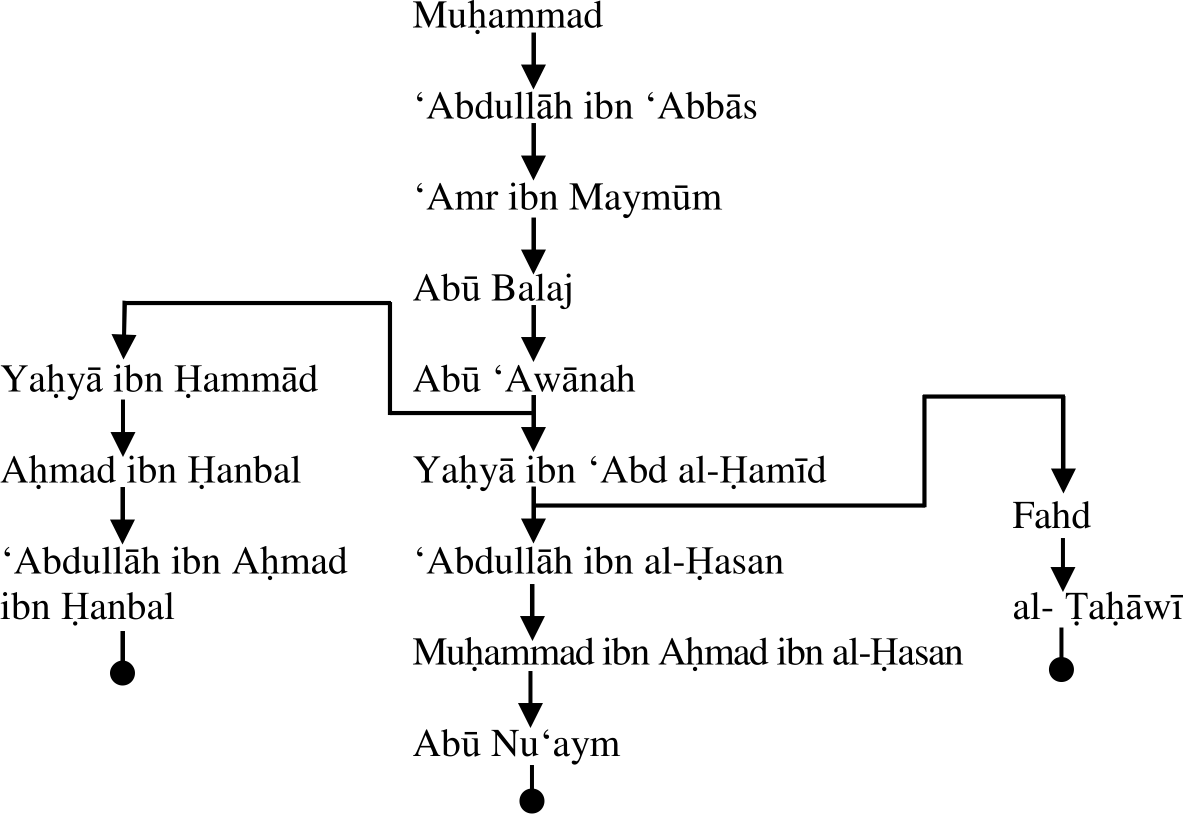
About Abu Balaj
Yahya ibn Sulaym al-Fazari, al-Mizzi records: Yahya ibn Ma‘in,
Ibn Sa‘d, al-Nasa’i and al-Daraqutni regard him to be
trustworthy; al-Bukhari says fihi nazar; Abu Hatim says that
he is salih al-hadith la ba’sa bihi.
Ibn Hibban says that he is not worthy of being adduced from if
he is its sole narrator.
Al-Juzjani says that he is not trustworthy.
About Yahya ibn ‘Abd al-Hamid al-Himmani,
Ibn Abi Hatim records that Abu Zur‘ah stopped narrating from
him;
Al-Dhahabi says that he is laysa bi mutqin and that Ahmad ibn
Hanbal and ‘Ali ibn Madini have impugned him (qad takallama
fihi Ahmad wa ‘Ali).
2. Sa‘d ibn Malik (rta)
حدثنا علي بن سعيد الرازي قال نا سويد بن
سعيد قال نا معاوية بن ميسرة بن شريح قال نا الحكم بن عتيبة عن
مصعب بن سعد عن ابيه قال امر رسول الله صلى الله عليه وسلم بسد
الابواب إلا باب علي قالوا يا رسول الله سددت الابواب كلها الا
باب علي قال ما أنا سددت ابوابكم ولكن الله سدها
Sa‘d ibn Malik reported from the Prophet (sws) that he ordered
for all the doors of the mosque to be closed. So, they were
closed and the door of ‘Ali was left open. People asked: “O
Messenger of God! You have closed our doors and left open the
door of ‘Ali.” The Messenger of God replied: “I did not open
them or close them; it was in fact God who closed them.”
Following is
the schematic illustration of the isnad of this narrative’s
variants:
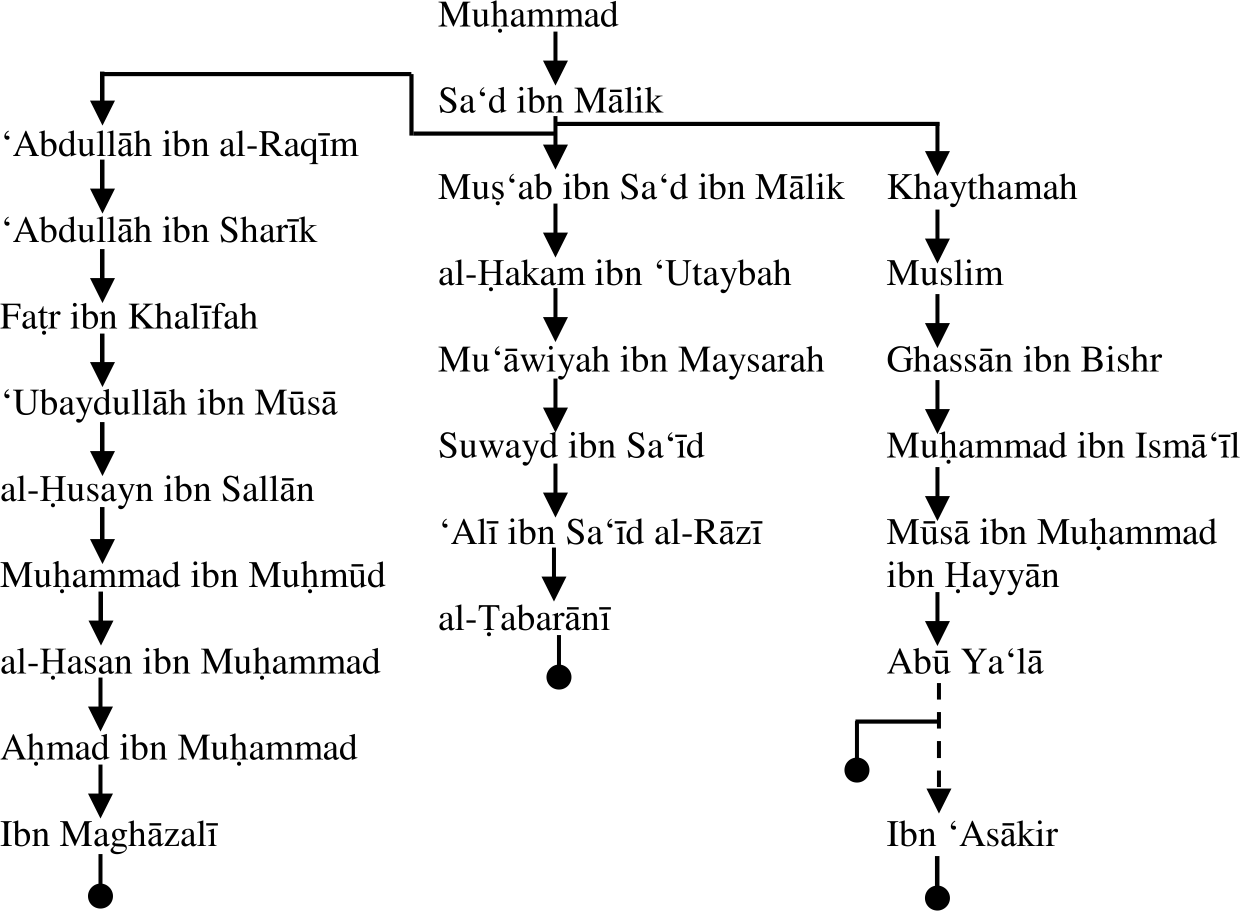
About ‘Abdullah
ibn al-Raqim, Ibn Hajar says that he is majhul
and records
that al-Nasa’i does not know him and that al-Bukhari says fihi
nazar.
About ‘Abdullah
ibn Sharik, al-Mizzi records: Sufyan ibn ‘Uyaynah and ‘Abd al-Rahman
ibn Mahdi would not narrate from him; the opinions attributed
to al-Nasa’i about him are laysa bi qawi and laysa bihi ba’s;
al-Juzjani says that he is liar; however, Ahmad ibn Hanbal,
Yahya ibn Ma‘in and Abu Zur ‘ah regard him to be trustworthy.
Besides mentioning him in his Al-Thiqat,
Ibn Hibban has also mentioned him in his Al-Majruhin
and said that he is an extremist Shiite who narrates from
authorities what does not resemble narratives from trustworthy
narrators and it is better to abstain from him than to adduce
from him.
About Suwayd ibn Sa‘id, al-Mizzi
records the following jarh:
Ya‘qub ibn Shaybah says that he is saduq
mudtarib al-hifz particularly when he had become blind.
According to al-Bukhari, Ṣalih Muhammad al-Baghdadi and Abu
Ahmad al-Hakim when he became blind he would narrate Hadith
which were not his. In the opinion of al-Nasa’i, he is laysa
bi thiqah wa la ma’mun. Yahya ibn Ma‘in says that he is halal
al-dam. Ibn Hibban has recorded him in his Al-Majruhin and
said: ya’ti ‘an thiqat fi al-mu‘dalat; yukhti fi al-athar wa
yuqallibu al-akhbar and also said that it is essential to
abstain from his narratives.
Ibn al-Jawzi
has recorded him in his Al-Du‘afa’ and stated that Yahya ibn
Ma‘in regarded him to be a great liar (khadhdhab) and
unreliable (saqit). He also said that if he had a horse and a
spear he would have attacked him. He also records that
according to Ahmad he is matruk al-hadith.
About ‘Ali ibn Sa‘id ibn Bashir al-Razi (d.
299 AH), al-Dhahabi records that according to al-Daraqutni he
is laysa bi dhak and would narrate what other would not.
However, Ibn Yunus says that he understood things and would
preserve them.
No information exists about Ghassan ibn
Bishr al-Kahili and Muhammad ibn Isma‘il Ja‘far al-Tahhan.
Musa ibn Muhammad ibn Hayyan is regarded
weak by Abu Zur‘ah.
3. Bara’ ibn ‘Azib (rta)
حدثنا ابن اسحاق أنا هوذة بن خليفة ابو
الاشهب حدثنا عوف عن ميمون عن البراء بن عازب قال كان لنفر من
اصحاب رسول الله صلى الله عليه وسلم ابواب شارعة في المسجد وان
رسول الله صلى الله عليه وسلم قال يوما سدوا هذه الابواب غير باب
علي بن ابي طالب فتكلم في ذلك ناس فقام رسول الله صلى الله عليه
وسلم فحمد الله واثنى عليه ثم قال اني امرت بسد الابواب غير باب
علي بن ابي طالب فقال فيه قائلكم واني والله ما فتحت شيئا ولا
سددته ولكنى امرت بشىء فاتبعته
Al-Bara’ ibn ‘Azib stated: “The doors of a group of companions
of the messenger opened in the mosque. God’s messenger one day
said: ‘Shut these doors except that of ‘Ali ibn Abi Talib.’ At
this, people started to talk about this. Thereupon, God’s
messenger got up and praised and exalted God and then said: ‘I
was ordered to close these doors except the door of ‘Ali
people from you started to talk about it. By God! I did not
open or close anything. I was ordered to do it and I followed
the orders.’”
Following is
the schematic illustration of the isnad of this narrative’s
variants:
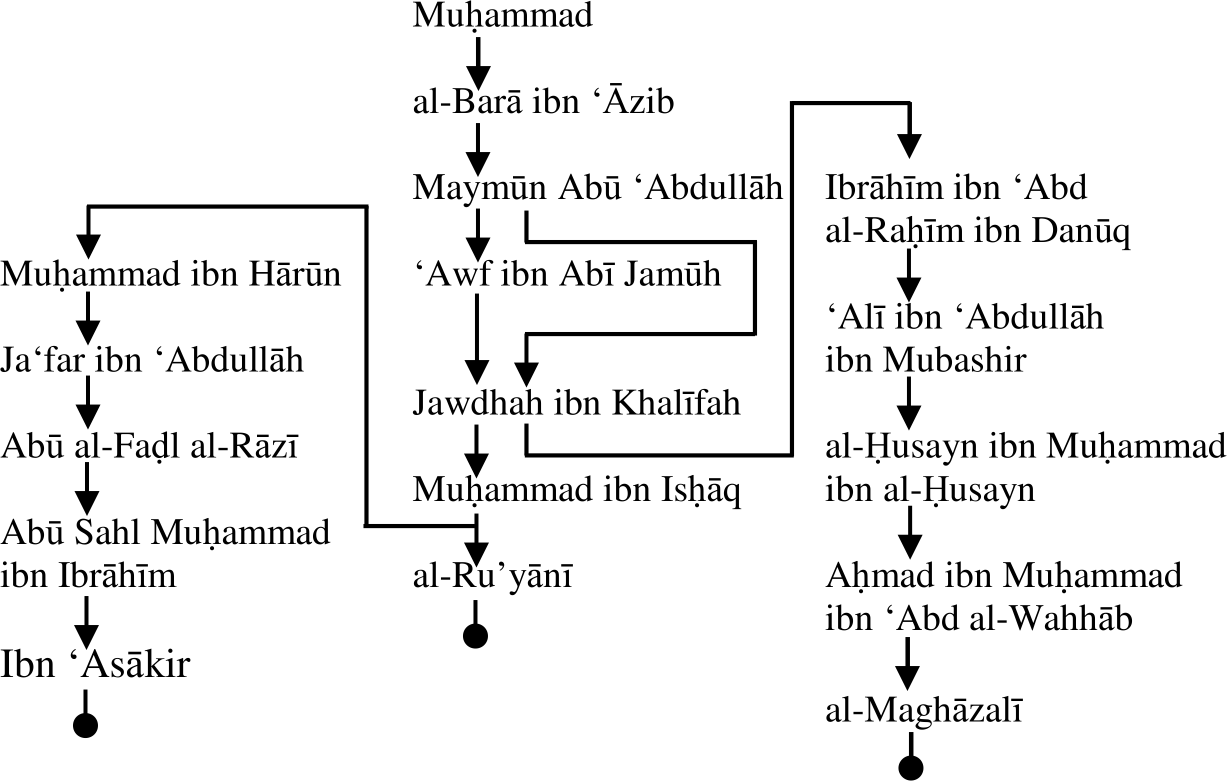
About Maymun
Abu ‘Abdullah, Ibn Abi Hatim records: When ‘Ali ibn al-Madini
asked Yahya ibn Sa‘id al-Qattan about him he showed signs of
dislike and said that Shu‘bah regarded him to be despicable;
Ahmad ibn Hanbal says that his narratives contain manakir;
Yahya ibn Ma‘in says that he is nothing.
Ibn Hajar records that he is laysa bi al-qawi in the eyes of
al-Nasa’i and al-Hakim.
His own verdict about him is that he is da‘if.
Al-Dhahabi says that though some
authorities have regarded Muhammad ibn Ishaq ibn Yasar al-Muttalibi
(d. 151 AH) to be reliable, others have regarded him to be
suspect. The jarh opinions are as follows:
Ibn Ma‘in says that though he is thiqah yet
he is laysa bi hujjah.
Al-Nasa’i says that he is laysa bi al-qawi
.
Al-Daraqutni says that he is la yuhtajju
bihi.
Sulayman al-Timi, Yahya ibn Sa‘id al-Qattan
and Hisham ibn ‘Urwah regard him to be kadhdhab.
‘Abd al-Rahman ibn Mahdi says that Yahya
ibn Sa‘id al-Ansari and Malik have impugned him. Malik, in the
opinion of Yahya ibn Adam, has regarded Muhammad ibn Ishaq a
dajjal.
According to Ahmad he indulges in tadlis a
lot.
Finally, summing up his own view, al-Dhahabi
says that Muhammad ibn Ishaq is hasan al-hadith salih al-hal,
saduq and there are unique things in his narrations which are
not corroborated by others because he does not have a sound
memory. While pointing to this last aspect, he says that such
narratives of his should be regarded as munkar.
Ibn Hatim records that in the opinion of
his father, Abu Hatim he is not al-qawi fi al-hadith and is
da‘if al-hadith.
Al-Mizzi records that when Ahmad ibn Hanbal
was asked whether Muhammad ibn Ishaq’s narratives which are
not corroborated by any other narration be accepted, he
replied in the negative and swore and said that he would
narrate from a whole group of people but would ascribe it to a
single person and would not specify which part is from which
particular person.
Ahmad ibn Hanbal is also reported to have said that his
narratives about maghazi can be accepted but when it comes to
what is allowed and prohibited in religion, then reliable and
trustworthy people are needed and he is not among them.
Though ‘Awf ibn Abi Jamilah has been
regarded as trustworthy by authorities, here is some contrary
evidence to his trustworthiness:
Abu Zur‘ah and al-‘Uqayli have mentioned
him in their respective books both titled Al-Du‘afa’.[27]
Al-Hakim records:
قلت فعوف
بن أبي جميلة قال ليس بذاك
I
asked: “[What about] ‘Awf ibn Abi Jamilah?”
He [al-Daraqutni] replied: “laysa bi dhaka.”
Al-Juzjani records:
عوف بن أبي
جميلة الأعرابي يتناول بيمينه ويساره من رأي البصرة والكوفة
‘Awf ibn Abi
Jamilah al-A‘rabi would [carelessly] accept narratives from
his right and left from the opinion of the [people of] Basrah
and Kufah.
Al-Mizzi records:
قال بعضهم
يرفع أمره إنه ليجيء عن الحسن بشيء ما يجيء به أحد
Some of them are
of the opinion that he is not trustworthy. He narrates from
al-Hasan what no one else ever has.
Also, ‘Awf is known to give preference to
‘Ali (rta)
over ‘Uthman (rta) and it is also known that since A’ishah (rta)
sided with ‘Uthman (rta), a group of the followers of ‘Ali (rta)
targeted her to besmear her character.
Nothing is known about Ahmad ibn Muhammad
ibn ‘Abd al-Wahhab.
4. Zayd ibn Arqam (rta)
أخبرنا محمد بن بشار قال حدثنا جعفر
قال حدثنا عوف عن ميمون أبي عبد الله عن زيد بن أرقم قال كان
لنفر من أصحاب رسول الله صلى الله عليه وسلم أبواب شارعة في
المسجد فقال رسول الله صلى الله عليه وسلم سدوا هذه الأبواب إلا
باب علي فتكلم في ذلك أناس فقام رسول الله صلى الله عليه وسلم
فحمد الله وأثنى عليه ثم قال أما بعد فإني أمرت بسد هذه الأبواب
غير باب علي فقال فيه قائلكم والله ما سددته ولا فتحته ولكني
أمرت بشيء فاتبعته
Zayd ibn Arqam
stated: “A group of companions of the Prophet had doors that
opened towards the mosque. So, the Prophet (sws) said: ‘Close
all these doors except the door of ‘Ali.’ Thereupon people
expressed their reservations on this. Thereupon, the Prophet (sws)
got up, praised God and exalted Him and then said: ‘I was
ordered to have these doors closed except that of ‘Ali and a
person from among you said what he said. By God! I did not
close them or opened them except that I was ordered to do a
thing and I complied.’”
Following is
the schematic illustration of the isnad of this narrative’s
variants:
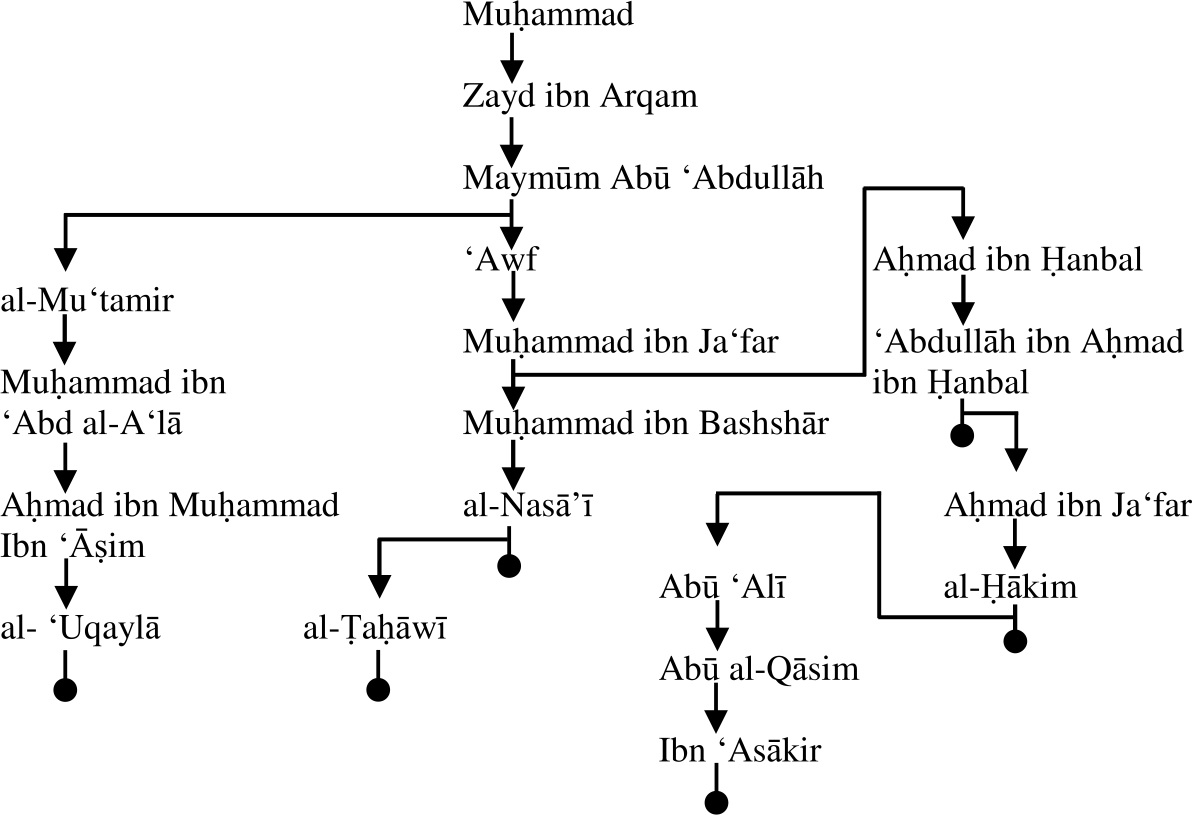
Jarh on Maymum
Abu ‘Abdullah and ‘Awf has just been presented.
5. Jabir ibn ‘Abdullah (rta)
أخبرنا
أحمد بن محمد بن غالب الفقيه قال قرأنا على أبي حفص بن بشران
حدثكم أبو عبد الله جعفر بن محمد بن جعفر بن الحسن بن جعفر بن
الحسن بن الحسن بن علي بن أبي طالب حدثنا محمد بن مهدي الميموني
حدثنا عبد العزيز بن الخطاب حدثني شعبة بن الحجاج أبو بسطام قال
سمعت سيد الهاشميين زيد بن علي بن الحسين بالمدينة في الروضة قال
حدثني أخي محمد بن علي أنه سمع جابر بن عبد الله يقول سمعت رسول
الله صلى الله عليه وسلم يقول سدوا الأبواب كلها إلا باب علي
وأومأ بيده إلى باب علي تفرد به أبو عبد الله العلوي الحسني بهذا
الإسناد
Jabir ibn
‘Abdullah stated: “I heard God’s Messenger say: ‘Close all
doors [that open in the mosque] except the door of ‘Ali.’ And
he gestured towards ‘Ali’s door.”
Following is
the schematic illustration of the isnad of this narrative’s
variants:
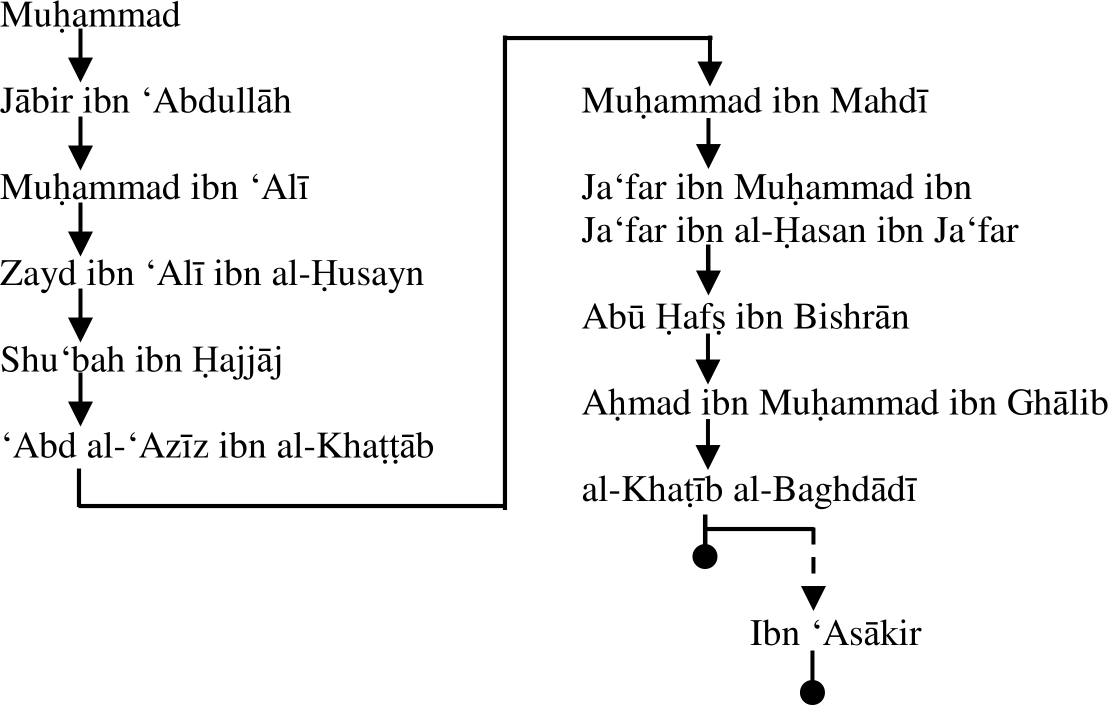
No information
is available on Muhammad ibn Mahdi al-Maymuni.
No jarh or
ta‘dil is available on Ahmad ibn Muhammad ibn Ghalib al-Faqih.
6. Jabir ibn Samurah (rta)
حدثنا إِبْرَاهِيمُ بن نَائِلَةَ
الأَصْبَهَانِيُّ حدثنا إِسْمَاعِيلُ بن عَمْرٍو الْبَجَلِيُّ
ثنا نَاصِحٌ عن سِمَاكِ بن حَرْبٍ عن جَابِرِ بن سَمُرَةَ قال
أَمَرَ رسول اللَّهِ صلى اللَّهُ عليه وسلم بِسَدِّ أَبْوَابِ
الْمَسْجِدِ كُلِّهَا غير بَابِ عَلِيٍّ رضي اللَّهُ عنه فقال
الْعَبَّاسُ يا رَسُولَ اللَّهِ قَدْرَ ما ادخل أنا وَحْدِي
وَأَخْرَجُ قال ما أُمِرْتُ بِشَيْءٍ من ذلك فَسَدَّهَا كُلَّهَا
غير بَابِ عَلِيٍّ وَرُبَّمَا مَرَّ وهو جُنُبٌ
Jabir ibn
Samurah stated: “God’s Messenger ordered all doors that opened
towards the mosque to be closed except the door of Ali. At
this, al-‘Abbas said: ‘Could not a part be left open so that I
could enter or leave?’ He replied: ‘I have not ordered any of
this so that all of these doors were closed completely except
the door of ‘Ali; [it was actually done at God’s behest].’ and
at times ‘Ali would be walking in the mosque and would be in
the state of ceremonial un-cleanliness.”
Following is
the schematic illustration of the isnad of this narrative:

About Isma‘il ibn ‘Amr ibn Najih
(d. 227 AH), Ibn al-Jawzi records that according to al-Darimi,
al-Daraqutni and Ibn ‘Adi, he is da‘if
and according to al-Khatib he would narrate manakir and
according to Ibn ‘Uqdah he is da‘if dhahib.
Abu Hatim also regards him to be da‘if.
About Nasih ibn ‘Abdullah, al-Mizzi
records: Yahya ibn Ma‘in says that he is not trustworthy and
another opinion attributed to him is laysa bi shay’; ‘Amr ibn
‘Ali says that he is matruk al-hadith and narrates munkar
narratives from Simak ibn Harb; al-Bukhari says that he is
munkar al-hadith; al-Tirmidhi says that he is lays bi al-qawi;
al-Nasa’i regards him to be da‘if and another opinion ascribed
to him is laysa bi thiqah; Abu Hatim says that he is da‘if al-hadith
munkar al-hadith from Simak; Ibn Hibban says that he is worthy
of being forsaken.
7. Sa‘d ibn Abi Waqqas
ثنا الحسن بن علي
ثنا يزيد بن هارون حدثنا فطر عن عبد الله بن شريك عن عبدالله بن
الأرقم قال أتينا المدينة أنا وأناس من أهل الكوفة فلقينا سعد بن
أبي وقاص فقال كونوا عراقيين كونوا عراقيين قال وكنت من أقرب
القوم إليه فسأل عن علي رضي الله عنه قال كيف رأيتموه هل سمعتوه
يذكرني قلنا لا أما باسمك فلا ولكنا سمعناه يقول اتقوا فتنة
الأخنس فقال أسماني قلنا لا فقال إن الخنس كثير ولكن لا أزال
أحبه بعد ثلاث سمعتهن من رسول الله صلى الله عليه وسلم إن رسول
الله صلى الله عليه وسلم بعث أبا بكر بالبراءة ثم بعث عليا
فأخذها منه فرجع أبا بكر كابتا فقال يا رسول الله فقال لا يؤدي
عني إلا رجل مني قال وسدت أبواب الناس التي كانت تلي المسجد غير
باب علي فقال العباس يا رسول الله سددت أبوابنا وتركت باب علي
وهو أحدثنا فقال إني لم أسكنكم ولا سددت أبوابكم ولكني أمرت بذلك
وقال في غزوة تبوك
‘Abdullah ibn Arqam stated: “I and some people from the
inhabitants of Kufa came to Madinah and met Sa‘d ibn Abi
Waqqas. Thereupon he said: ‘Become among the people of Iraq!
Become among the people of Iraq for I am the closest of people
to them.’ He then asked about ‘Ali and said: ‘How do you see
him? Did you hear him mention me?’ We replied: ‘No not by your
name. But we heard him say: “Fear the trial of the al-Akhnas.”
So, he said: ‘Did he name me?’ We said: ‘No.’ He then said:
‘There are many Khuns but I will continue to love him after I
heard three things from God’s Messenger. God’s Messenger sent
Abu Bakr with Surah al-Tabah and then sent ‘Ali after him who
took it from him. Abu Bakr returned embarrassed and said: “O
God’s Messenger! You did not give it from me except to a
person from me and the doors of people adjacent to the mosque
except that of ‘Ali were closed.” So, al-‘Abbas said: ‘O God’s
Messenger! You closed our doors and left open that of ‘Ali
while he is the youngest among us.’ At this, he replied: ‘I
did not make you inhabit nor did I close your doors. I was
actually ordered to do it.’ This happened in the battle of
Tabuk.”
Following is
the schematic illustration of the isnad of this narrative’s
variants:
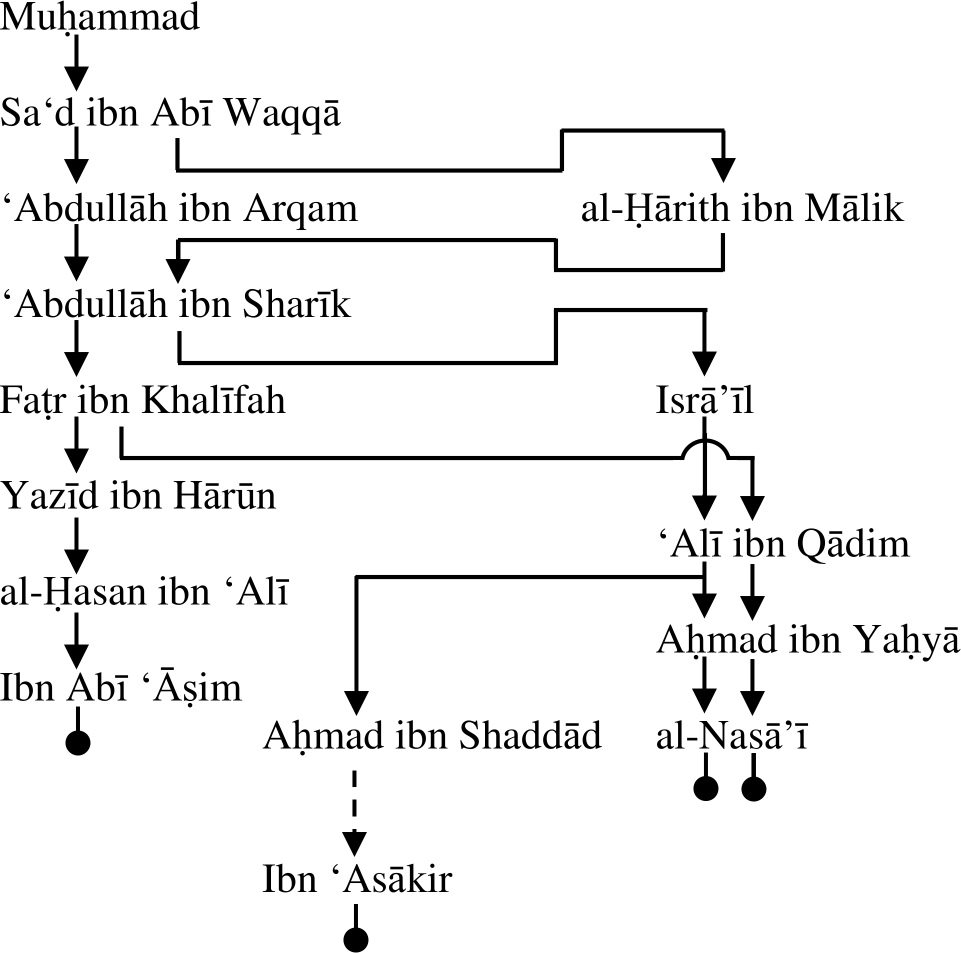
The jarh on ‘Abdullah ibn Sharik has been
presented earlier.
8. Anas ibn Malik
(rta)
حدثناه محمد بن
عبدوس قال حدثنا محمد بن حميد قال حدثنا تميم بن عبد المؤمن قال
حدثنا هلال بن سويد قال سمعت أنس بن مالك يقول لما سد رسول الله
صلى الله عليه وسلم أبواب المسجد أتته قريش فعاتبوه فقالوا سددت
أبوابنا وتركت باب علي فقال ما بأمري سددتها ولا بأمري فتحتها
Anas ibn Malik said: “When God’s Messenger closed the doors
that opened in the mosque, the Quraysh came and expressed
their anger at him and said: ‘You have closed our doors and
left open the door of ‘Ali.’ At this he said: ‘I did not order
to close them nor did I order to open them; [it was God Who
did so].’”
Following is
the schematic illustration of the isnad of this narrative:
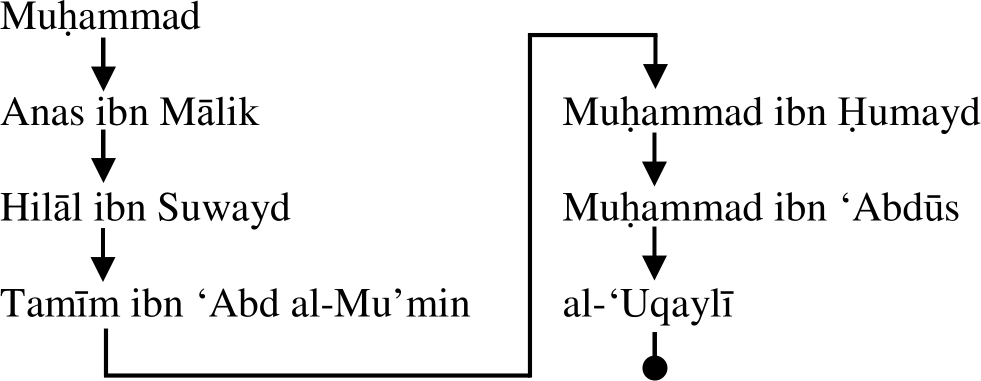
About Hilal ibn
Suwayd, Ibn Hajar writes: Al-Bukhari has recorded him among
his Al-Du‘afa’ and said that his narratives are not
corroborated; Al-‘Uqayli has also recorded him in his Al-Du‘afa’
while Ibn Hibban says that he is trustworthy.
Ibn Abi Hatim
mentions him Tamim ibn ‘Abd al-Mu’min without any jarh or
ta‘dil.
Ibn Hibban says that he narrates maqtu‘ narratives.
_____________
____________________________
|